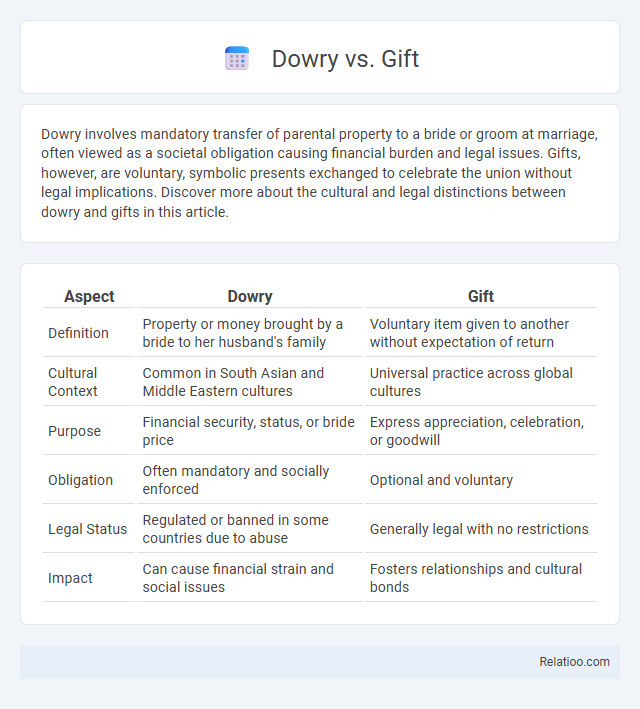Dowry involves mandatory transfer of parental property to a bride or groom at marriage, often viewed as a societal obligation causing financial burden and legal issues. Gifts, however, are voluntary, symbolic presents exchanged to celebrate the union without legal implications. Discover more about the cultural and legal distinctions between dowry and gifts in this article.
Table of Comparison
| Aspect | Dowry | Gift |
|---|---|---|
| Definition | Property or money brought by a bride to her husband's family | Voluntary item given to another without expectation of return |
| Cultural Context | Common in South Asian and Middle Eastern cultures | Universal practice across global cultures |
| Purpose | Financial security, status, or bride price | Express appreciation, celebration, or goodwill |
| Obligation | Often mandatory and socially enforced | Optional and voluntary |
| Legal Status | Regulated or banned in some countries due to abuse | Generally legal with no restrictions |
| Impact | Can cause financial strain and social issues | Fosters relationships and cultural bonds |
Understanding the Concept of Dowry
Dowry refers to the valuable property or money brought by a bride to her husband's family at marriage, often rooted in social and cultural traditions. Unlike gifts, which are given voluntarily without obligation, dowry carries expectations and obligations tied to matrimonial alliances and inheritance rights. Understanding the concept of dowry helps you recognize its historical implications and potential impact on family dynamics and legal frameworks.
Defining What Constitutes a Gift
A gift is a voluntary transfer of property or money given without expectation of return or conditions, distinguished from dowry which involves transfer of wealth typically by the bride's family to the groom's family as part of marriage customs. Dowry is often legally regulated due to its social implications and possible coercion, whereas gifts are generally spontaneous expressions of goodwill and affection. Understanding what constitutes a gift helps you navigate legal boundaries and familial expectations by recognizing transfers made freely without transactional obligations.
Cultural Significance: Dowry vs Gift
The cultural significance of dowry versus gifts reflects deeply rooted social traditions where dowry often symbolizes a transfer of wealth from the bride's family to the groom's, reinforcing social status and alliances. Gifts, in contrast, are usually symbolic tokens of love or goodwill exchanged between families without the transactional weight associated with dowries. Your understanding of these practices highlights how dowries may sometimes perpetuate gender inequalities, whereas gifts tend to embody mutual respect and celebration within cultural rituals.
Legal Perspectives on Dowry and Gifts
Legal perspectives differentiate dowry from gifts based on intent and context, with dowry often considered a transactional exchange tied to marriage, subject to specific regulations in many jurisdictions. Dowry prohibitions, such as those under the Dowry Prohibition Act in India, criminalize the practice to prevent exploitation and abuse, whereas gifts are typically recognized as voluntary transfers without coercion or conditionality. Courts focus on the presence of coercion, the timing relative to marriage, and the nature of transfers to distinguish unlawful dowry demands from lawful gifting.
Key Differences Between Dowry and Gift
The key differences between dowry and gift lie in their purpose, obligation, and timing; dowry is a mandatory transfer of parental property or money at the time of marriage, primarily meant to support the bride and establish family alliances, whereas gifts are voluntary offerings given without expectation or legal requirement. Dowry often carries social and legal implications, sometimes linked to familial expectations and customs, while gifts represent expressions of goodwill and affection without contractual bindings. Understanding these distinctions helps you navigate cultural practices and legal frameworks related to marriage transactions effectively.
Social Implications and Controversies
Dowry practices often perpetuate gender inequality and financial strain within families, contrasting sharply with gifts which are voluntary and typically symbolize goodwill without coercion. The social implications of dowry include increased domestic violence, arranged marriages based on financial expectations, and societal pressure on brides' families, making it a contentious issue in many cultures. Your understanding of these distinctions can help navigate the complexities and advocate for ethical marital customs free from exploitation.
Economic Impact on Families
Dowry practices often impose significant financial burdens on families, draining resources that could otherwise support education and healthcare. Gifts, in contrast, typically involve voluntary exchanges with less economic strain, fostering goodwill without long-term financial obligations. Your understanding of these distinctions highlights how dowries can exacerbate economic inequality, whereas gifts promote more sustainable family economics.
Ethical Considerations: Morality and Tradition
Dowry practices often face ethical scrutiny due to their association with gender inequality and financial exploitation, contrasting with gifts that symbolize goodwill and mutual respect without obligatory demands. While dowry traditions can perpetuate social pressure and economic burdens on families, gifts emphasize voluntary exchange fostering positive relationships. Morally, rejecting dowry in favor of gift-giving aligns with progressive values that promote dignity, consent, and cultural evolution.
Dowry-Related Crimes vs Gift Exchanges
Dowry-related crimes involve unlawful demands, harassment, or violence linked to dowry payments, predominantly affecting women in South Asian communities. Gift exchanges, in contrast, are voluntary and culturally symbolic acts without coercion or legal repercussions. Understanding the distinction is crucial for addressing dowry abuse while preserving the positive social role of gift giving.
Promoting Healthy Marriage Practices
Promoting healthy marriage practices involves clearly distinguishing between dowry, gifts, and mutual exchanges, emphasizing consent and fairness to prevent financial abuse and gender inequality. Encouraging the exchange of voluntary gifts rather than coercive dowry demands supports respect and equity between partners. Legal frameworks and community education play crucial roles in eradicating dowry-related exploitation and fostering marriages based on mutual respect and trust.

Infographic: Dowry vs Gift
 relatioo.com
relatioo.com